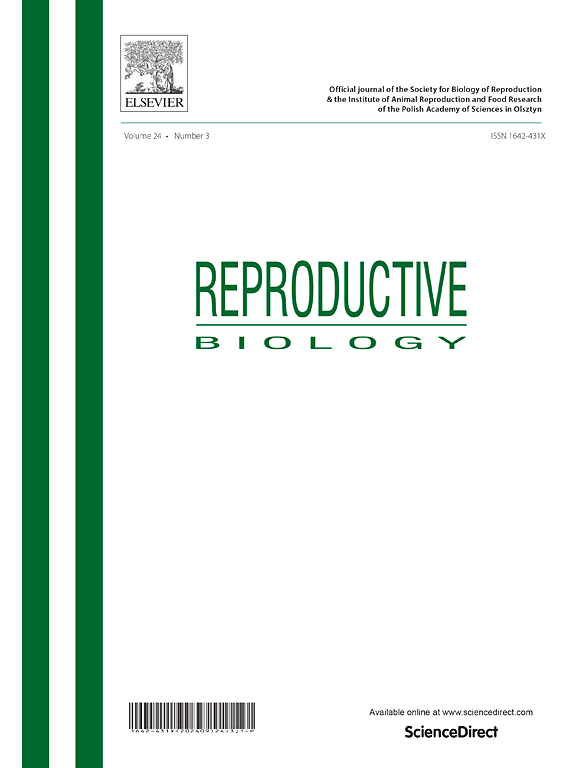Partial biochemical and immunological characterization of an isolated 52.1 kDa pregnancy-associated glycoprotein charge variant
IF 2.5
3区 生物学
Q3 REPRODUCTIVE BIOLOGY
引用次数: 0
Abstract
Pregnancy-associated glycoproteins (PAGs) are synthesized in the placental cells of ruminants and are detectable in blood, milk, and urine. Many of these proteins have been obtained and characterized from placental extracts by precipitation with 80 % ammonium sulfate. The possibility of purifying PAGs by precipitation with other concentrations of ammonium sulfate remains unexplored. We aimed to study PAG proteins obtained from extracts of ovine placenta at 100 days of gestation through precipitation with 40 % ammonium sulfate (Extract 40). The main protein complex (130 kDa) was obtained after Extract 40 precipitation. Under reducing SDS-PAGE conditions, the 130 kDa complex dissociated in two PAG proteins with apparent molecular weights of 52.1 kDa and 26.1 kDa. The 130 kDa protein appeared to be a molecular complex consisting of two copies of the 52.1 kDa protein linked to one copy of the 26.1 kDa protein, presumably by disulfide bonds. Furthermore, the 52.1 kDa protein consisted of at least three isoforms with distinct isoelectric points. Amino acid microsequencing of the 52.1 kDa protein revealed a chimeric structure containing amino acid sequences of PAG1, PAG4, PAG6, and PAG1-like proteins. This procedure recovered a novel 130 kDa protein complex composed of 26.1 kDa and two 52.1 kDa PAGs. To the best of our knowledge, this has not been previously reported as heterologous polymeric molecules.
分离出的 52.1 kDa 妊娠相关糖蛋白电荷变体的部分生物化学和免疫学特征
妊娠相关糖蛋白(PAG)在反刍动物的胎盘细胞中合成,可在血液、乳汁和尿液中检测到。其中许多蛋白质都是通过 80% 硫酸铵沉淀法从胎盘提取物中获得并表征的。用其他浓度的硫酸铵沉淀纯化 PAG 的可能性仍有待探索。我们的目的是研究用 40% 硫酸铵(提取物 40)沉淀从妊娠 100 天的绵羊胎盘提取物中获得的 PAG 蛋白。提取物 40 沉淀后得到了主要的蛋白质复合物(130 kDa)。在还原 SDS-PAGE 条件下,130 kDa 复合物解离成两个 PAG 蛋白,表观分子量分别为 52.1 kDa 和 26.1 kDa。130 kDa 蛋白似乎是由两个 52.1 kDa 蛋白拷贝与一个 26.1 kDa 蛋白拷贝(可能是通过二硫键连接)组成的分子复合物。此外,52.1 kDa 蛋白至少由三种等电点不同的异构体组成。对 52.1 kDa 蛋白的氨基酸微序列分析表明,它是一种嵌合结构,包含 PAG1、PAG4、PAG6 和 PAG1-like 蛋白的氨基酸序列。这一过程发现了一个由 26.1 kDa 和两个 52.1 kDa PAG 组成的新型 130 kDa 蛋白复合物。据我们所知,以前从未报道过这种异源聚合分子。
本文章由计算机程序翻译,如有差异,请以英文原文为准。
求助全文
约1分钟内获得全文
求助全文
来源期刊

Reproductive biology
生物-生殖生物学
CiteScore
3.90
自引率
0.00%
发文量
95
审稿时长
29 days
期刊介绍:
An official journal of the Society for Biology of Reproduction and the Institute of Animal Reproduction and Food Research of Polish Academy of Sciences in Olsztyn, Poland.
Reproductive Biology is an international, peer-reviewed journal covering all aspects of reproduction in vertebrates. The journal invites original research papers, short communications, review articles and commentaries dealing with reproductive physiology, endocrinology, immunology, molecular and cellular biology, receptor studies, animal breeding as well as andrology, embryology, infertility, assisted reproduction and contraception. Papers from both basic and clinical research will be considered.
 求助内容:
求助内容: 应助结果提醒方式:
应助结果提醒方式:


